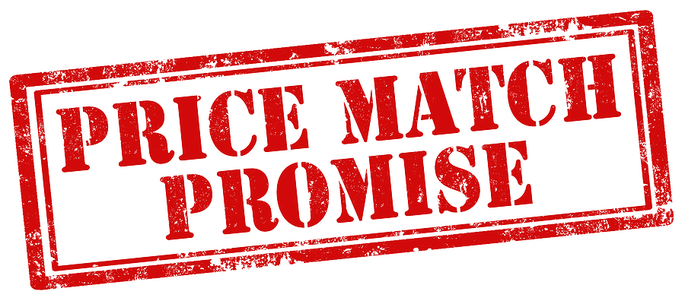The world of bookmaking is a highly competitive industry these days. The number of bookmakers now biding for your business has increased massively, which puts the punter in a rather lucrative position of being able to jump between the ones that have the best prices more often.
A way in which some bookmakers are fighting back is by providing a more competitive range of odds, more often. This comes in the form of ‘Price Promises’ which allows the bookmaker to guarantee the best odds (or joint best odds) in the industry. These markets will often come in the form of horse races, but they might also be on individual players to win a certain tournament or in team events such as cup finals.
Current Price Promise Offers
The best Price Promise offers currently available are shown below.
bet365 will be best price or joint best price on every horse for all races shown live on ITV Racing. Applies to bets placed on Win and Each-Way Fixed Odds markets from 10am on the day of the race. Prices matched against selected bookmakers.
Common Rules & Terms
Price promises don’t tend to have overly fussy terms attached but there are some key points to be aware of before you place your bets:
- Eligibility – Price promises are likely to be on specific horse races or specific events, such as Tennis Grand Slams. As a result, make sure you know that your selection qualifies
- Which bookmakers are included? – Price promises won’t be against any odds that you can find, but they will often include a wide selection of well-known bookies
- Stake limits – Be aware that the price promise might include a ceiling on how much can be staked, with the remaining balance settled at the original odds
- Bet type – This offer will often apply to win and each way singles. It may apply to selections in multiples but this will be clearly stated
- Price Fluctuations – Bear in mind that odds will fluctuate but the matched prices will normally be at the point of placing the bet, rather than being the best price or equal best offered at any point
Why Do Bookmakers Have Different Odds?

Although not an exact match, the odds reflect the relative chance of a certain outcome. This could be a horse to win a race, a football team to win or a tennis player to win a tournament along with millions of other sports and markets. So, if that’s the case, why do odds differ from bookmaker to bookmaker? To answer this question, we have to briefly look into how the odds are set.
How Do Bookies Set Their Prices?
The job of setting the odds or the price on a certain market is the job of the odds compiler. Each bookmaker will have their own odds compilers who will use their wide knowledge of a certain sport to determine what odds each outcome should have. To do this they will take into consideration a number of factors, these include:
- Ability – The starting point for setting the odds will be the relative strength of the competitors involved
- Form – Whether it be an individual, a team or an animal such as a racehorse or greyhound, their historic performances, particularly recently, will play a huge part in determining their chances next time out. For example, a golfer who has missed the cut in their last five tournaments will have longer odds that a player with recent wins or top ten finishes
- Location – Where an event takes place has a large bearing on lots of team events such as football or rugby matches where home advantage can play a big part in the outcome. It can also be relevant in racing, with horses and greyhounds performing differently at different tracks or courses
- Profit Margin – Although the odds indicate probability, the reason there isn’t an exact balance is because bookmakers are businesses and as a result, they need to make a profit over time. This is factored into the prices on offer, and is known as the overround, vigorish or edge, with certain markets having a larger overround than others. Usually this is related to how unpredictable an event is
- Betting Patterns – In order for a certain market to work for the bookie, they need to take an expected relative amount across each selection in that book, whether this is the home team, away team and the draw in football or each horse in a race. If more or less money is wagered on a particular selection, the odds compilers will adjust their prices accordingly to balance the book
This is just a brief outline of the key a points but there is many other factors to consider when setting a price.
Variance Between Bookmakers
As we can see, the starting point for determining the odds will be of the opinion of the odds compilers, and this will undoubtable be different from firm to firm. In general, the prices will be similar, i.e. you are unlikely to find one bookmaker offering 2/1 on a horse with another offering 16/1. That said, there will be differences, and finding which bookie has the better odds on a certain outcome is of benefit to punters.
If a certain betting operator is offering odds that are an outlier from competing companies, for example 10/1 for a horse where others are offering 5/1, they will attract more money on this selection and are likely to adjust their odds accordingly. At other times however, a bookmaker might stick to their original decision, which is known as taking a position, where they consider themselves to be correct.
All this means that on every betting market, there will be often small but sometimes quite significant differences between the odds on offer.
How Do Price Promises Work

The concept of it all is providing the best odds for a certain market across the industry. The bookmaker will simply scour what their major competitors are offering for a certain race or event and then at worst match the price, but ideally beat it if they feel they can.
The first thing to note is which other bookies your bookmaker is going head to head with. What you will find is that they will target around half a dozen or so of the most popular betting sites and will beat or match their prices. Although they won’t necessarily have the standout best price, you won’t get a better price by betting elsewhere.
You will generally find that this isn’t something that you need to do yourself. Firms running this offer will usually be monitoring the prices themselves and will adjust their prices to match.
The price matched will be the standard odds offered by those selected competitors. If any have boosted prices or enhanced specials, these won’t be considered. Also if inflated odds are advertised by mistake, theses won’t be matched.
If a price is being matched on a horse race, these will probably apply to early prices, up to around 15 minutes before the race when the board prices are available. If matching a football game, the matched price will be on the odds prior to starting, not the in-play prices. If matching odds on an event like a golf or tennis tournament, they will normally apply to the pre-tournament odds, until the first tee-off or the opening game.
Price Promise Example
As an example, we’ve taken a three mile Grade 2 chase which is run at Newbury. This race has nine runners. Our bookmaker is Bookmaker A, and they have an offer of a price promise which will match or better the odds offered by Bookmakers B, C and D. We have highlighted the top prices for each runner in bold.
Newbury Grade 2 Chase (3m)
| Horse | Bookmaker A | Bookmaker B | Bookmaker C | Bookmaker D | Odds Received |
|---|---|---|---|---|---|
| 1 | 13/8 | 6/4 | 6/4 | 13/8 | 13/8 |
| 2 | 15/8 | 2/1 | 2/1 | 11/4 | 11/4 |
| 3 | 9/2 | 4/1 | 4/1 | 7/2 | 9/2 |
| 4 | 11/2 | 5/1 | 5/1 | 5/1 | 11/2 |
| 5 | 8/1 | 7/1 | 7/1 | 8/1 | 8/1 |
| 6 | 9/1 | 7/1 | 7/1 | 10/1 | 10/1 |
| 7 | 20/1 | 14/1 | 14/1 | 16/1 | 20/1 |
| 8 | 20/1 | 20/1 | 20/1 | 20/1 | 20/1 |
| 9 | 25/1 | 33/1 | 33/1 | 33/1 | 33/1 |
As you can see, our bookmaker has the best odds for horses 1, 3, 4, 5, 7 and 8 so we will already get the best odds from this selection of sites. In addition, we will also get the top price matched on horses 2, 6 and 9.
